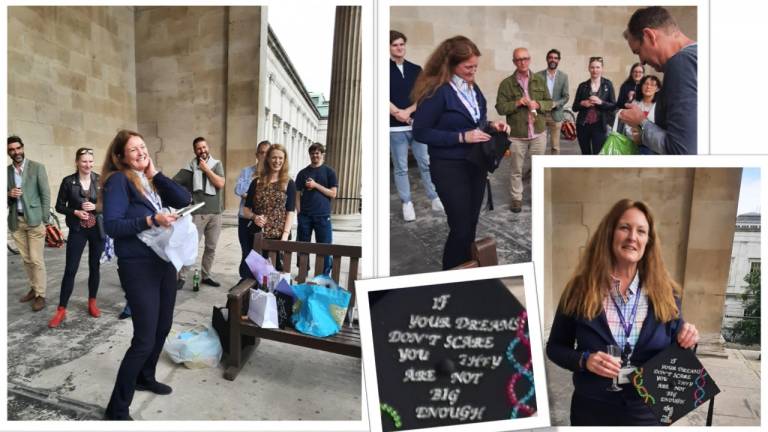Congratulations Dr Catherine Walker
9 July 2021
Many congratulations Catherine on successfully defending her thesis entitled: Quantifying Human Dietary Change over the Last 30,000 Years. Catherine carried out her PhD under Prof Mark Thomas.

Her examiners were Matthew Collins from Cambridge and Rhiannon Stevens from UCL Institute of Archaeology. She did fantastically well passing without any corrections. We are delighted for her and pleased that she will be staying in Biosciences to work on a short postdoctoral project.
Well done Catherine!
Here is the Abstract:
Dietary change has been linked to many aspects of human evolution over the last three million years, including tool use, brain size increase, aerobic capacity and gut biology. Furthermore, failure to adapt to dietary changes over the last 10,000 years has been implicated in a number of complex and chronic diseases including obesity, type II diabetes, some cancers and coronary heart disease. Such ‘diseases of modernity’ are more common in agrarian and industrial societies than among hunter-gatherers, and it has been argued that this is due to a mismatch between modern diets and the ancestral diets to which our metabolism should be optimised.
The aims of this research have grown out of the qualitative studies that perpetuate narratives around human and hominin diets, particularly around the central theme of dietary mismatch and ‘paleo’-named diets. In this work, I investigate nutrient-level differences between modern post-industrial diets, modern hunter-gatherer diets, prehistoric (Palaeolithic, Neolithic and Bronze Age) diets reconstructed from archaeological data, clinical intervention diets, fad diets including the Paleo Dietä, Keto Dietä and Atkins Dietä, fast food diets and milk. Using these data, I develop an hypothesis on the evolution of dietary choice.
Modern diets are enriched for certain nutrients, for some of which we have strong taste avidities (e.g. sodium, sucrose, starch, certain fatty acids). By quantifying differences in inferred nutrient profiles between ancestral and modern diets, I examine the nutrients enriched in modern diets, the trajectories of nutrient composition change through time, what might be driving these changes, and why we have evolved taste preferences for some nutrients that in a modern setting are considered ‘unhealthy’. I also examine how nutrients correlate in ancestral foods and explore if avidities for nutrients enriched in modern diets would lead to healthy nutrient profiles in an ancestral setting.
 Close
Close

